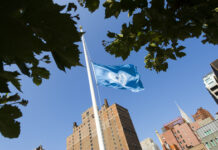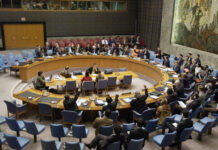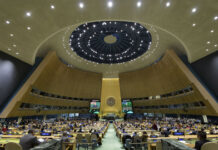Photo credit: DiasporaEngager (www.DiasporaEngager.com).
Yosef Nelson’s work on international labor solidarity began with the case of Hong Seng Knitting, a garment factory in Thailand found to have illegally withheld hundreds of thousands of dollars in wages from its workers. The factory produces Nike products for many schools, including the University of Pittsburgh, where Nelson studies history.
Along with a group of fellow students, Nelson worked to press the university to drop its contract with Nike on the heels of a 2021 report from the Workers Rights Consortium knocking the Bangkok-based factory for depriving workers of nearly $600,000 in wages between May and October of 2020.
As one of the world’s most powerful apparel brands, Nike could demand that the factory repay their workers. But according to WRC, Nike has sided with the factory, claiming that the vast majority of workers chose to take unpaid leave during the pandemic slow down.
The schools that Nelson and his fellow students have pressured into canceling their contracts over the violations have been similarly intransigent, despite many of them being affiliates of WRC. The independent labor monitoring organization assists 145 universities in the United States and Canada in enforcing binding labor standards they have adopted to protect workers producing apparel and other goods bearing university logos.
While the campaign focused on Hong Seng Knitting continues, Nelson and students at other universities – including Michigan, Texas, Berkeley, and NYU – are launching a new organization dedicated to supporting global worker struggles on college campuses.
Students for International Labor Solidarity (SILS) will work to use their presence at universities to fight for the rights of workers in global supply chains, frequently collaborating with unions in the Global South.
“Initially our whole goal was to enforce the university’s supplier and licensing code of conduct,” Nelson told Inequality.org in an interview. “That kind of morphed into SILS as we decided that we wanted to expand the movement to make sure that we can help garment workers around the world and just to have a better network for organizing.”
The students seek to build up pressure on universities by educating their peers, raising awareness of violations on campus, and staging protests.
This is not the first time that students have sought to leverage their presence at universities to push for more ethical garment supply chains. In the late 1990s and early 2000s, the organization United Students Against Sweatshops grew rapidly to over 250 campuses in the United States and also created the WRC.
SILS takes inspiration from its predecessor and hopes to reinvigorate the movement to build international labor solidarity on college campuses. Nelson feels the current moment is a particularly exciting time for organizing students because of the uptick in political activity on campuses opposing Israel’s war in Gaza.
“People are very invested in the politics of what is going on in universities and where universities have been spending their money,” he explained. That will help put the issue of justice in the global garment industry “on people’s radars” as well.
Further Reading:
Source of original article: Institute for Policy Studies (ips-dc.org).
The content of this article does not necessarily reflect the views or opinion of Global Diaspora News (www.GlobalDiasporaNews.com).
To submit your press release: (https://www.GlobalDiasporaNews.com/pr).
To advertise on Global Diaspora News: (www.GlobalDiasporaNews.com/ads).
Sign up to Global Diaspora News newsletter (https://www.GlobalDiasporaNews.com/newsletter/) to start receiving updates and opportunities directly in your email inbox for free.






























